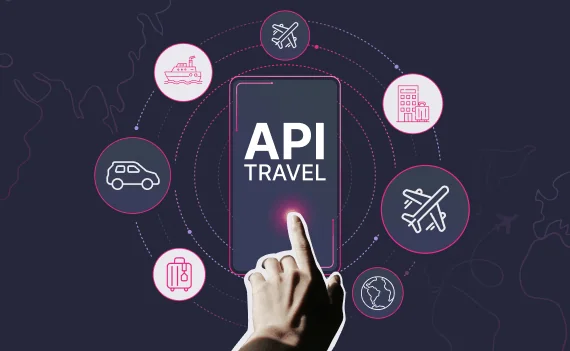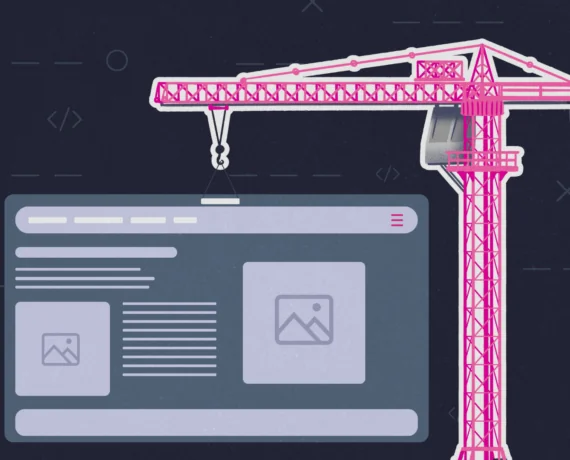Table of Content
- Introduction to Real-time Booking
- The Most Common Symptoms of Inaccurate Real-Time Booking Data
- Choosing the Right Pricing Update Approach
- Key Features of Scheduling Software
- Business Management with Scheduling
- Benefits of Online Scheduling
- Tracking Success—Performance Metrics and KPIs
- Overcoming the Common Challenges
- Streamlining Operations
- How Can You Prevent Problems Before They Occur?
- Best Practices
- Reducing No-Shows and Cancellations
- Real-Time Data as a Strategic Advantage
Get a fresh start on your project
Book a callAs the CEO of a travel tech platform, you know your customers rely on accurate, up-to-date booking information to plan their perfect trips. But what are the consequences to the business for double bookings? In other words, when data fails—whether it’s unavailable accommodations or fluctuating prices—trust is lost, complaints pile up, and revenue takes a hit. Just like every good doctor who treats the cause of an illness rather than just the symptoms, you must uncover the root of the problem before charting the path to a solution. Adding online booking features can prevent double bookings by ensuring real-time updates and seamless integration with your reservation systems.
You surely know the importance of business reputation, and as long as your business is connected to the Travel and Hospitality industry, you understand that one of the success pillars is simply booking. But what are the most crucial aspects of booking? Accuracy and timing. Let’s dive into how these factors impact your business, how to address them effectively, and how they occur at first.
An awesome customer experience is crucial for business efficiency and satisfaction. Exceptional service and user-friendly booking systems can significantly enhance your business’s reputation and operational success.
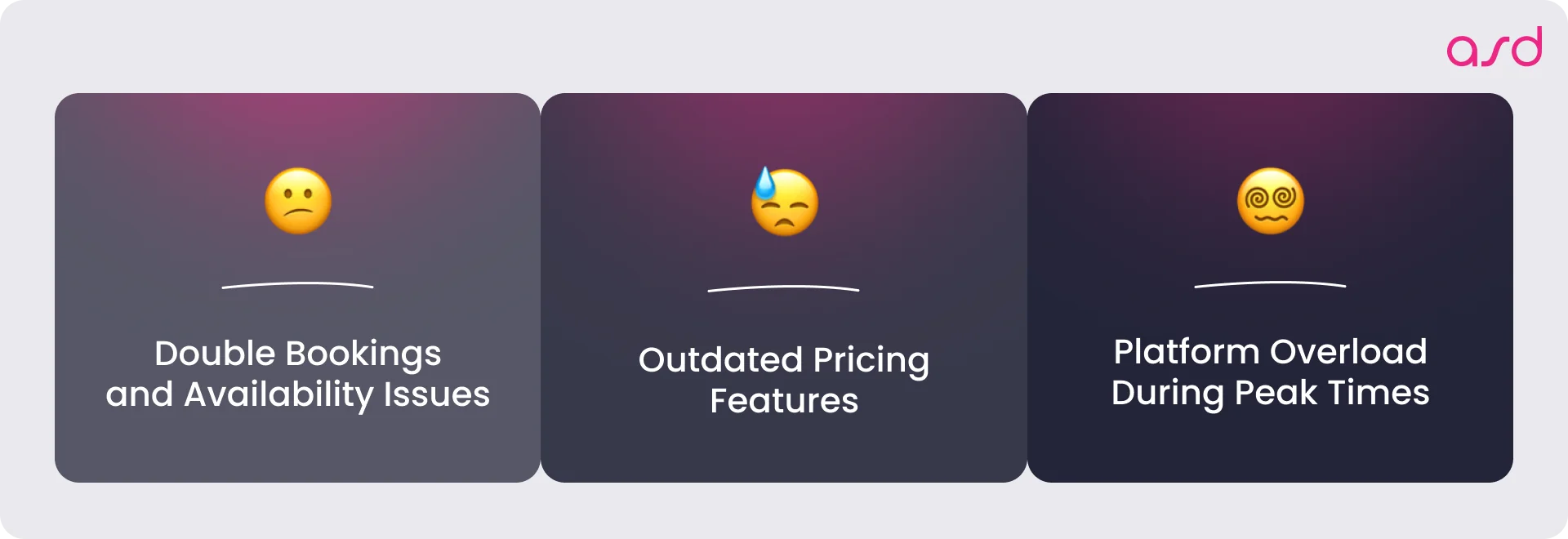
Introduction to Real-time Booking
Real-time booking is revolutionising the way businesses manage appointments and scheduling. This innovative approach allows customers to book appointments online at any time, receiving instant confirmation. By integrating with Google Calendar and other calendar systems, real-time booking ensures accurate availability, making it a game-changer for small businesses and the real estate industry.
For businesses, the benefits are substantial. Real-time booking helps save time and money by automating the scheduling process and reducing the need for manual intervention. The booking page can be customized to fit the business’s brand, providing a seamless and professional customer experience. Secure payments can be made online through integrations like Stripe, adding another layer of convenience for both businesses and their clients.
Moreover, real-time booking is particularly useful for managing group events and bookings, ensuring that all participants have up-to-date information. By offering packages and services that can be booked online, businesses can promote growth and focus on providing excellent services. In essence, real-time booking streamlines the scheduling process, allowing businesses to operate more efficiently and effectively.
The Most Common Symptoms of Inaccurate Real-Time Booking Data
- A traveler books what they believe is the perfect getaway, only to receive a notification that their chosen accommodation is unavailable.
- Your support team spends hours managing complaints about double bookings or cancelled reservations because the data is outdated or inconsistent.
These frustrations of double or multiseats bookings don’t just cost your platform immediate client’s action—they erode trust, drive users to competitors, and tarnish your reputation. And even when you know how much does it cost to develop software, you surely understand, that losing your credibility would cost double. If these scenarios feel familiar, it’s time to dig deeper into the root causes.
Email notifications play a crucial role in managing client appointments and reducing no-shows. By sending timely reminders and including scheduling links in emails, you can maintain client engagement and anticipation. Additionally, providing clients with the ability to easily reschedule their appointments can further enhance customer experience and reduce no-shows.
Problem 1: Double Bookings and Availability Issues
What Happens:
A traveler books what they think is their perfect stay, only to be notified later that it’s unavailable. These double bookings lead to cancelled reservations, unhappy customers, and support teams working overtime.
Why It Happens:
Double bookings typically occur when your platform doesn’t receive frequent updates from suppliers or struggles to process large volumes of available data. This issue is exacerbated during peak booking periods when systems are under additional strain.
How to Fix It:
- Frequent Updates: Collaborate with suppliers to ensure their inventory is updated regularly. Establish Service Level Agreements (SLAs) to define update frequency and accuracy.
- Automated Monitoring: Implement tools that detect discrepancies in real-time and flag potential issues before they affect users.
- Control Over Booking Data: Ensure your platform has control over booking data to prevent double bookings. This includes having admin control over security and support in enterprise settings.
- Instant Availability Verification: If availability changes after a booking attempt, notify customers immediately and offer alternative options to maintain their trust.
By implementing these fixes, your platform can avoid common availability pitfalls and provide users with a more reliable experience.
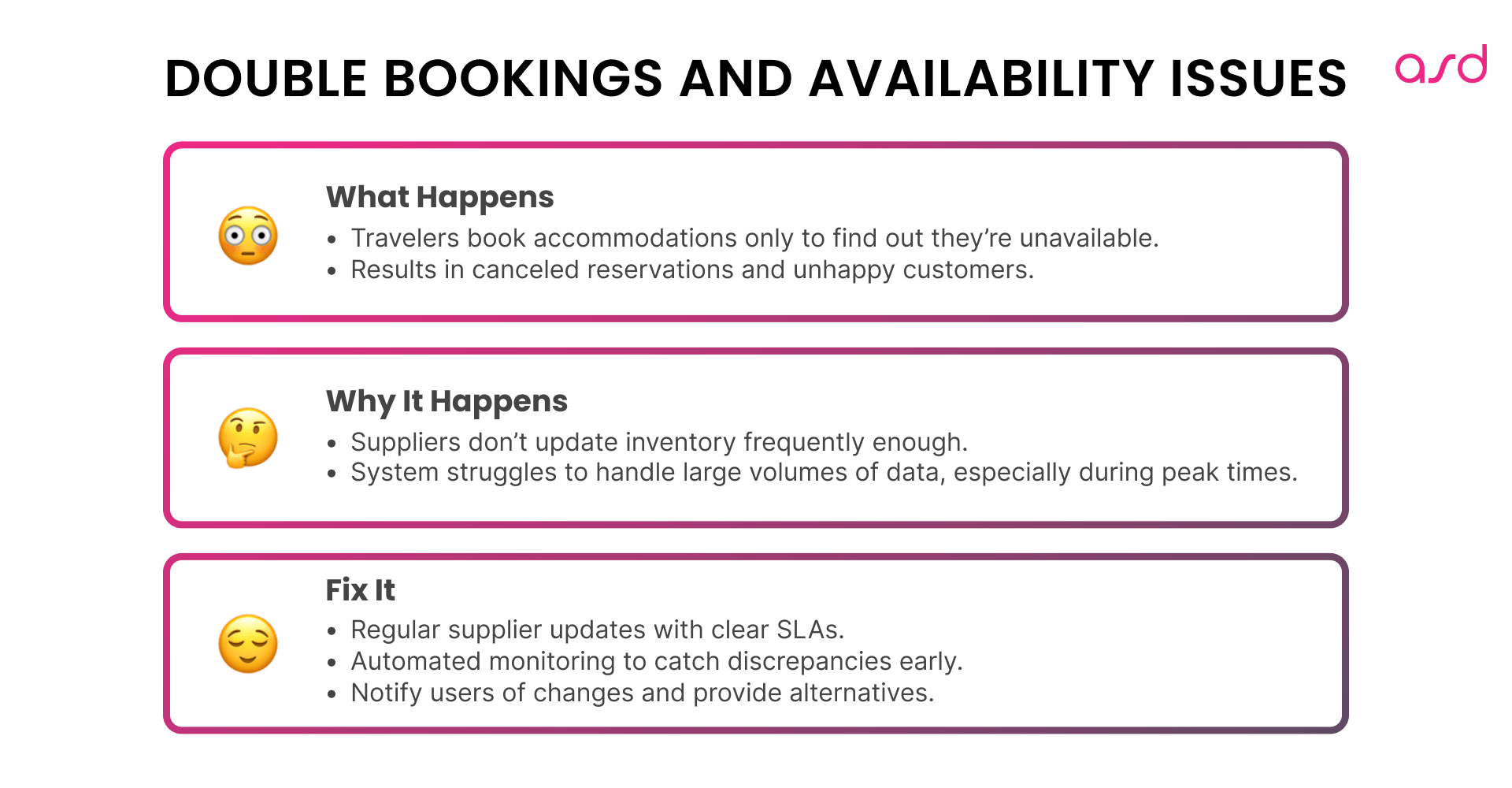
Problem 2: Platform Overload During Peak Times
What Happens:
Your platform struggles to handle a sudden influx of traffic during high-demand periods, such as holidays or special events. This can result in slower response times, delayed updates, or even complete system crashes.
Why It Happens:
Many platforms aren’t built to manage sudden traffic surges. Insufficient server resources, lack of load balancing, and unoptimized caching strategies can all contribute to system failures during peak periods.
How to Fix It:
- Scalable Infrastructure: Use cloud-based solutions that automatically scale resources up during peak times and scale down during quieter periods to save costs.
- Use of scalable technologies
- Load Balancing: Distribute incoming requests across multiple servers to prevent any single server from becoming overwhelmed.
- Stress Testing: Simulate high-traffic scenarios well before peak seasons. Identify and resolve bottlenecks in your infrastructure to ensure smooth performance during busy periods.
With a robust infrastructure, your platform can remain fast and responsive even during the busiest times, keeping users satisfied and engaged.
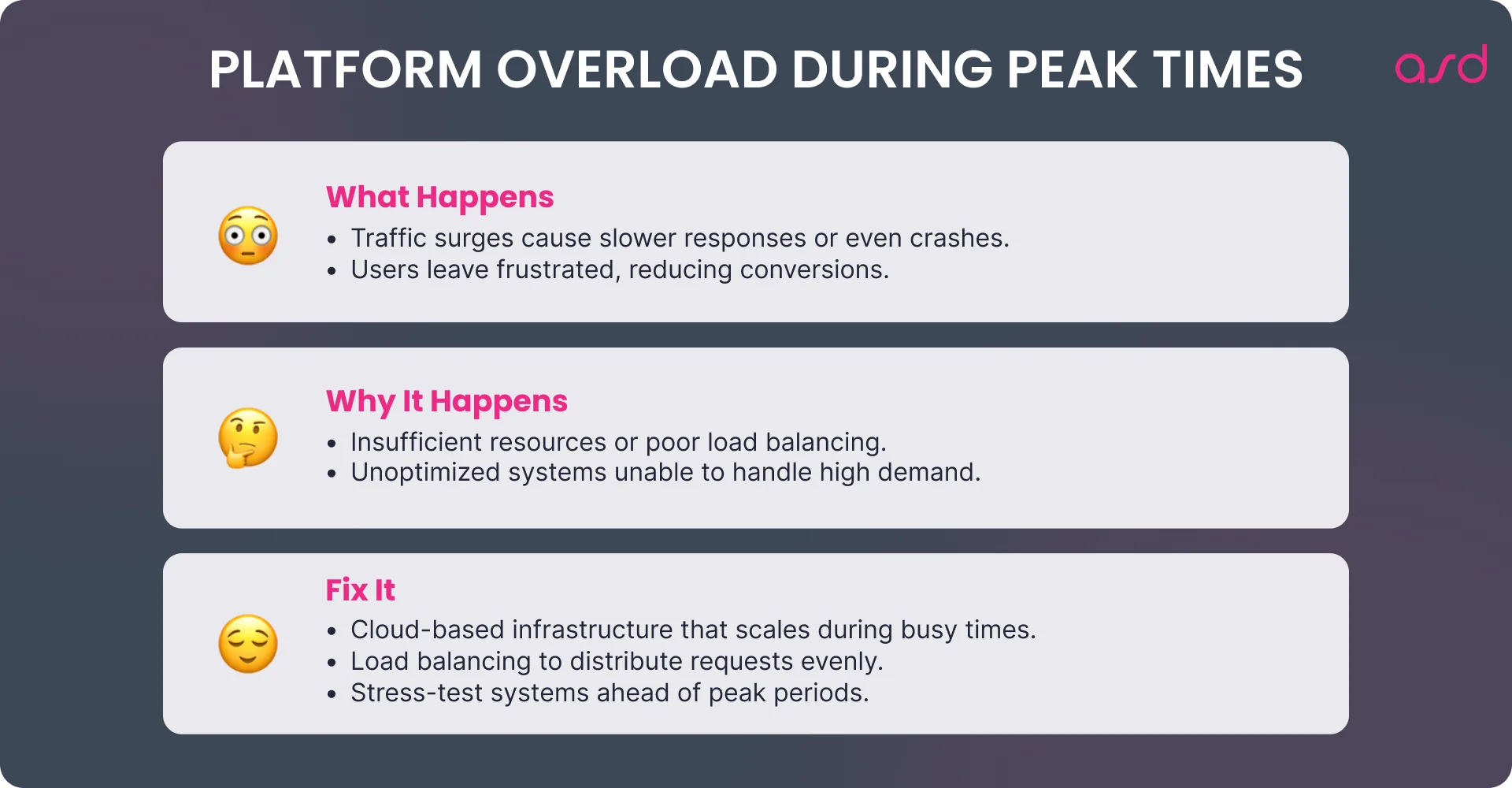
Choosing the Right Pricing Update Approach
Keeping your data fresh and accurate is key for your customers, especially in industries like travel, where availability and pricing can change rapidly. Real-time updates can help businesses grow by maintaining accurate pricing, which enhances business performance and revenue. There are two primary methods to consider when managing real-time updates effectively. Each has its strengths and ideal use cases, which we’ll explore below.
-
Continuous System Checks (Polling)
What it is: Polling involves your system performing regular checks at scheduled intervals to gather updated data on availability, pricing, or other key metrics.
How it works: Your platform sends periodic requests to suppliers or data sources to refresh information. These checks occur at intervals you define—hourly, every few minutes, or even more frequently, depending on your needs.
Advantages:
- Reliable for platforms where immediate updates are not critical.
- Ensures consistency and stability over time, reducing the risk of missing key data.
Disadvantages:
- Slight delays can occur between checks, meaning updates may not always reflect real-time changes.
- It can be resource-intensive if frequent polling is required, potentially adding load to your system.
-
Webhook/API Endpoints
What it is: This approach enables instant updates by having suppliers send real-time data to your system as changes occur.
How it works: Instead of your system initiating updates, data is “pushed” to your platform through webhooks or API endpoints whenever there’s a change, such as a new booking or updated price.
Advantages:
- Perfect for platforms requiring real-time accuracy.
- Reduces system resource usage since updates only occur when necessary.
Disadvantages:
- Requires suppliers to support and maintain webhooks or APIs.
- Potential dependency on the reliability of external systems.
Setting up real-time updates effectively is crucial to ensure accuracy and meet specific business needs.
One of our clients, a major travel platform, successfully combined these methods to achieve an optimal balance of stability and speed. Polling was used to maintain overall consistency, ensuring no data gaps, while API endpoints delivered real-time updates for critical events like last-minute bookings or price changes. This approach provided their users with a seamless and reliable experience while minimizing system overload.
Pro Tip: Combining both methods can maximize stability and speed. This hybrid approach leverages the strengths of each technique—polling for consistency and webhooks/APIs for real-time accuracy—to create a robust and efficient system.
Learn more about our Product Software Development Services
-
Building a Resilient Technical Foundation
Of course, even the best update approach won’t work if your infrastructure isn’t up to the task. Think of it like constructing a skyscraper—you need a solid foundation to support the weight.
For example, one client struggled with slow booking updates during peak times. By optimizing their API latency, we saw immediate improvements. Bookings became faster and more reliable, even during high-traffic periods.
Let us take care of technical questions
Feel free to focus on the big picture while ASD Team lays the tech foundation of your project
Let us take care of technical questions Feel free to focus on the big picture while ASD Team lays the tech foundation of your project

Key Features of Scheduling Software
Scheduling software comes packed with features designed to make managing appointments and bookings a breeze. Key features include online booking, calendar integration, and automated reminders. These tools help businesses keep track of their schedules and ensure that customers are always informed about their appointments.
Many scheduling software solutions also offer secure payments, online invoices, and package deals, making it easier for businesses to manage their finances. Intuitive integration with existing systems, such as CRM software, is another crucial feature, allowing businesses to streamline their operations and improve customer interactions. By customizing the scheduling software to meet their specific needs, businesses can revolutionize the way they manage their schedules and bookings.
Business Management with Scheduling
Effective business management with scheduling is crucial for streamlining operations and increasing revenue. Scheduling tools enable businesses to manage their appointments, bookings, and customer interactions all in one place. This centralization simplifies the scheduling process, making it easier to keep track of appointments and ensure that nothing falls through the cracks.
With scheduling tools, businesses can customize their booking pages, set automated reminders, and track customer interactions. Integrating these tools with other systems, such as CRM software and payment gateways, provides a seamless customer experience. By using scheduling tools, businesses can save time and money, allowing them to focus on delivering exceptional customer service and promoting growth.
Benefits of Online Scheduling
Online scheduling offers numerous benefits for businesses, making it an indispensable tool in today’s fast-paced environment. One of the primary advantages is the significant time savings. By allowing customers to book appointments online, businesses can reduce the time spent on phone calls and emails, freeing up staff to focus on more critical tasks.
Another key benefit is the reduction in no-shows. Online scheduling enables businesses to send automated reminders and notifications to customers, ensuring they remember their appointments. This feature, combined with real-time availability, makes it easier for customers to book appointments at a time that suits them, further reducing the likelihood of cancellations.
For businesses with multiple locations, online scheduling provides a unified system to manage bookings across different sites. This centralization not only improves efficiency but also provides valuable insights into bookings and customer behavior. These insights can inform marketing and growth strategies, helping businesses to better understand and meet their customers’ needs.
Integrating online scheduling with CRM software enhances this understanding, allowing businesses to track customer interactions and preferences. Overall, online scheduling is a powerful tool that streamlines the scheduling process, improves the customer experience, and increases revenue. By leveraging these benefits, businesses can offer a more efficient and satisfying service to their customers.
Tracking Success—Performance Metrics and KPIs
Now, that your platform is up and running, how will you know if your real-time data solution is working? Integrating various tools can help track key performance indicators (KPIs) like data latency (how quickly updates appear), booking error rate (how often bookings fail due to inaccuracies), and customer satisfaction scores. These metrics will reveal the strengths and areas for improvement in your real-time solution.
The power of real-time data can significantly enhance business operations and customer satisfaction.
With one OTA client, we monitored conversion rates closely, noticing that faster data updates led to higher booking completions. Tracking performance metrics provided critical insights, helping the client refine and improve the user experience.
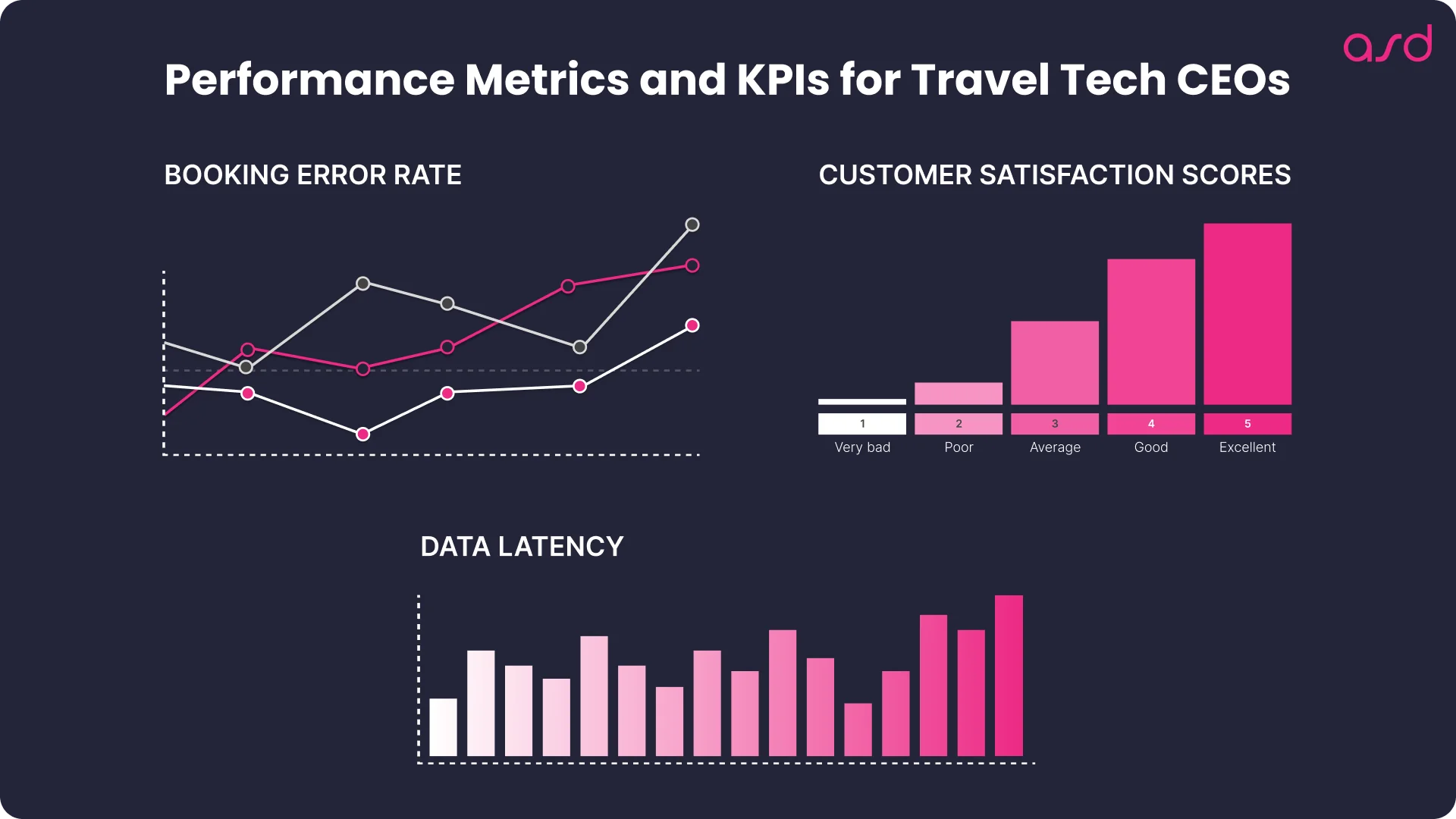
Overcoming the Common Challenges
As with any big change, real-time booking accuracy brings challenges. You may face technical failures, dependency on third-party booking partners, and the sheer volume of data updates. For example, one of our clients faced data overload when integrating updates from hundreds of properties. We implemented a scalable infrastructure to handle the data load, preventing delays and ensuring smooth operation. The scheduling solution is versatile, catering to both individual users and large enterprises, and managing real-time availability for in-person meetings. So, yes, hire a software development team with expertise in your field to ensure the best results.
Managing relationships with booking partners is equally important. Without consistent data from partners, real-time accuracy suffers. At ASD Team, we set up Service Level Agreements (SLAs) to establish clear expectations, making sure data reliability was upheld. By planning ahead for these challenges and customizing solutions to meet specific business needs, your platform will have the resilience to handle whatever comes its way.
Additionally, using SMS messages for sending reminders and notifications can significantly reduce no-shows and improve client engagement.
Streamlining Operations
Streamlining operations is essential for businesses to reduce costs, increase efficiency, and improve customer satisfaction. Scheduling tools play a pivotal role in this process by automating tasks such as sending reminders and notifications. This automation reduces the administrative burden on staff, allowing them to focus on more critical tasks.
Scheduling tools also integrate with other tools, such as Google Calendar, enabling businesses to manage their appointments and bookings in one place. Customizing workflows and approval processes to meet the unique needs of each business further enhances efficiency. By streamlining operations, businesses can save time and money, ultimately providing better service to their customers.
How Can You Prevent Problems Before They Occur?
When it comes to building software from scratch, creating APIs, or developing similar systems, staying ahead of potential issues is crucial. Utilizing effective scheduling tools can help avoid double bookings by organizing and automating your appointment management processes. Running as many possible scenarios as you can helps identify weaknesses before they arise.
Integrating secure online payments can enhance customer convenience and reduce no-show rates, ultimately leading to higher earnings for businesses. Always maintain oversight of your data flow to detect and address errors immediately. Fix any issues as soon as they occur and monitor them to prevent recurrence. Mistakes are inevitable but manageable—what matters most is how quickly and effectively you act to fix them before they damage your reputation.
Customer Experience and Engagement
Enhancing the customer experience is critical for any business, and scheduling software plays a key role in this. A user-friendly booking page with real-time availability makes it easy for customers to book appointments and services. Automated reminders and notifications help businesses build strong relationships with their customers, ensuring they never miss an appointment.
Scheduling software also allows businesses to manage and sell various products within a point of sale system, streamlining sales processes and improving payment handling. Additionally, it enables businesses to track customer interactions and preferences, providing personalized services and improving customer satisfaction. By focusing on the customer experience, businesses can increase customer loyalty, improve travel app retention rate, and boost revenue. A seamless booking process not only keeps customers happy but also promotes growth and success for the business.
Payment Processing and Security
Secure payment processing is a crucial aspect of any online scheduling system, and Reservio offers a range of payment options to suit different business needs. With Reservio, businesses can accept online payments through a secure payment gateway, reducing the risk of no-shows and late payments. The platform integrates with popular payment providers like Stripe, allowing businesses to accept payments in real-time and streamline their payment process.
Reservio’s payment processing system is designed to be secure and reliable, with features like encryption and two-factor authentication to protect sensitive customer information. By offering secure payment options, Reservio helps businesses build trust with their customers and promote a positive customer experience. This not only enhances the overall scheduling process but also ensures that businesses can focus on delivering exceptional services without worrying about payment issues.
Calendar and Scheduling Management
Effective calendar and scheduling management is essential for businesses to streamline their operations and reduce no-shows. Reservio’s calendar feature allows businesses to manage appointments and group events in one place, making it easy to stay organized and on top of their schedule. The platform integrates with Google Calendar, iCal, and other popular calendar apps, allowing businesses to access their schedule from anywhere and stay up-to-date with real-time availability.
Reservio’s scheduling management tools enable businesses to set reminders, send notifications, and automate repetitive tasks, saving time and reducing the risk of human error. By providing a comprehensive calendar and scheduling management system, Reservio helps businesses focus on what matters most – delivering exceptional customer experiences and promoting growth. This integration ensures that businesses can manage their schedules efficiently, keeping both staff and customers happy.
Integrations and Customizations
Integrations and customizations are key features of scheduling tools that allow businesses to tailor their scheduling solutions to their unique needs. These tools can integrate with a range of systems, including CRM software, payment gateways, and Google Calendar, providing a cohesive and efficient workflow.
Customizations enable businesses to create bespoke booking pages, set automated reminders, and track customer interactions. Integrating with payment systems like Stripe ensures a seamless and secure payment experience for customers. By leveraging integrations and customizations, businesses can create a scheduling solution that meets their specific needs and enhances the overall customer experience.
Security and Compliance
Security and compliance are essential considerations when implementing scheduling software. Features such as secure payments, data encryption, and access controls protect customer information and maintain trust in the brand. Businesses must also ensure that their scheduling software complies with relevant regulations, such as GDPR and HIPAA.
By prioritizing security and compliance, businesses can protect their customers’ data and streamline their processes. This reduces errors and improves overall efficiency, ensuring the security and integrity of customer data. Scheduling software that focuses on security and compliance helps businesses maintain a strong reputation and build lasting relationships with their customers.
Customer Support and Success
At Reservio, customer support and success are top priorities, with a dedicated team available to provide assistance and guidance every step of the way. The platform offers a range of support resources, including tutorials, webinars, and FAQs, to help businesses get the most out of their scheduling system. Reservio’s customer success team is committed to helping businesses achieve their goals, whether it’s reducing no-shows, increasing revenue, or improving customer satisfaction.
With Reservio, businesses can access support through multiple channels, including email, phone, and live chat, ensuring that help is always available when needed. By prioritizing customer support and success, Reservio helps businesses build a strong foundation for growth and success, and provides the tools and resources needed to stay ahead of the competition. This comprehensive support system ensures that businesses can navigate any challenges and maximize the benefits of their scheduling tools.
Best practices on how to avoid double bookings:
1. Scenario Planning and Testing
Simulate a wide range of scenarios during the development phase. Stress-test the system under high-traffic loads, unexpected inputs, and external system failures to ensure robustness.
2. Data Flow Oversight
Implement tools and dashboards that provide real-time insights into your system’s data flow. This ensures you can spot anomalies as soon as they occur. Managing classes alongside appointments is crucial for improving client engagement and attendance. Tools such as automated reminders and scheduling features cater not only to individual appointments but also to classes, enabling better organization and reducing no-shows, thus enhancing overall business efficiency. Sending reminder messages, such as emails and SMS, plays a significant role in improving meeting attendance and reducing no-shows. These messages help build anticipation and ensure clients are aware of their upcoming appointments or events.
3. Error Monitoring and Resolution
Establish automated alerts for system errors, ensuring they are addressed as soon as they arise. Once an issue is fixed, conduct a thorough post-mortem to ensure it doesn’t happen again.
4. Team Training and Collaboration
Equip your team with the skills and resources they need to identify potential vulnerabilities early. Collaboration between developers, QA teams, and data managers ensures that issues are caught at every stage.
5. Emergency Plan
Have a robust emergency plan in place to address unexpected issues quickly. This should include predefined escalation paths, roles and responsibilities, and a checklist for mitigating impacts on users. Regularly rehearse this plan with your team to ensure readiness.
6. Continuous Improvement
Regularly review and refine your processes, based on past experiences and industry developments. Use feedback from your system’s performance to iteratively strengthen its resilience.
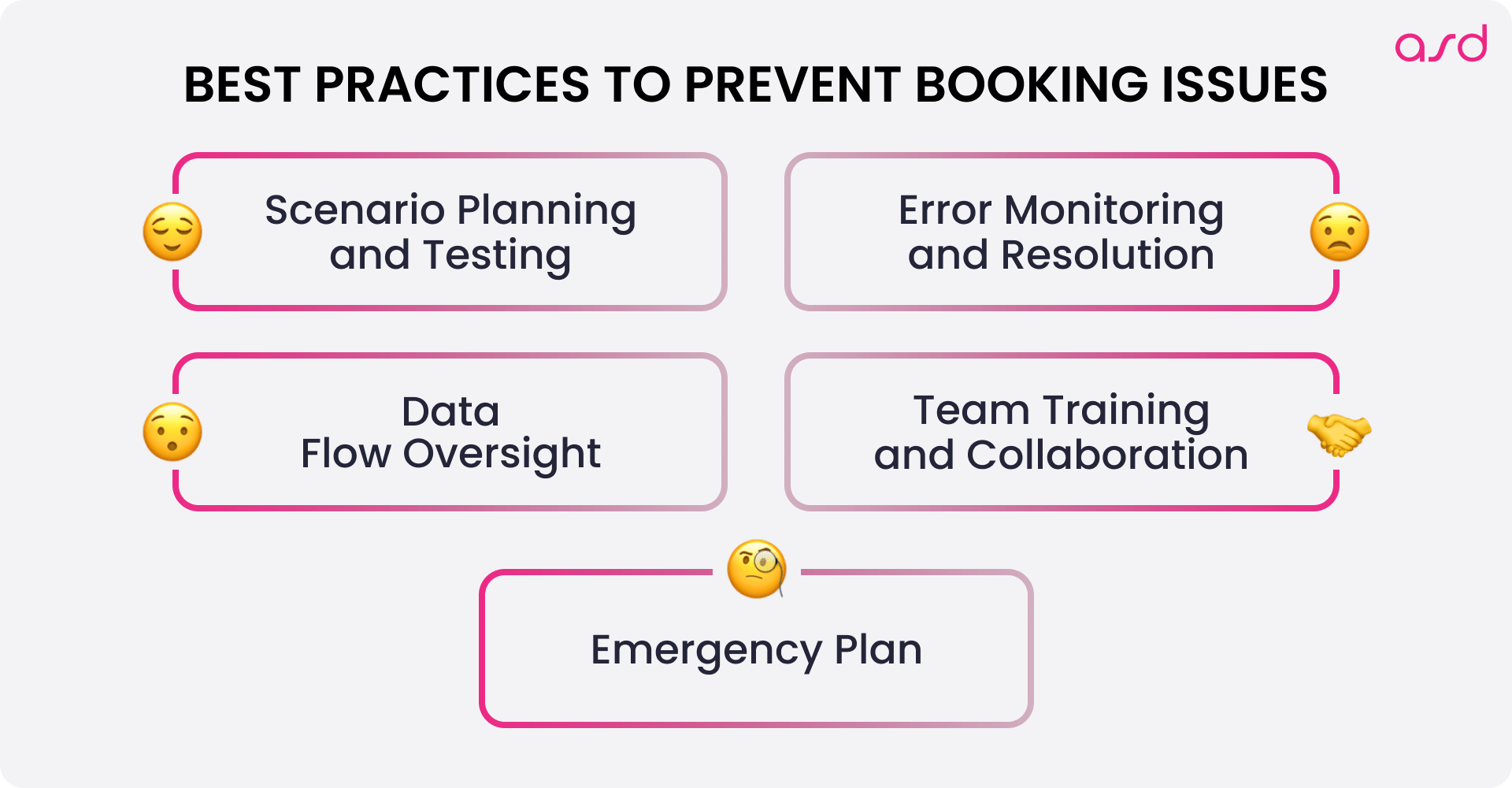
Learn more about our Travel and Hospitality Software Development Services
Reducing No-Shows and Cancellations
Reducing no-shows and cancellations is a key benefit of using scheduling tools, as it can help businesses increase revenue and improve customer satisfaction. Automated reminders and notifications play a crucial role in ensuring that customers remember their appointments, significantly reducing the likelihood of no-shows.
Scheduling tools also allow businesses to set up secure payment systems, such as online payments, which can further reduce no-shows and cancellations. Providing an exceptional customer experience, with features like real-time availability and customized booking pages, also helps in minimizing cancellations. By reducing no-shows and cancellations, businesses can save time and money, focusing on delivering exceptional customer service to their happy clients.
Real-Time Data as a Strategic Advantage
For CEOs of travel tech platforms, real-time data access isn’t merely a technical upgrade; it’s a strategic investment. It strengthens customer trust, reduces operational strain, and positions your platform as a leader in seamless booking experiences. Embracing real-time updates isn’t just about addressing issues—it’s about transforming them into opportunities. Additionally, the ability to share booking information with clients is crucial for enhancing user engagement and streamlining interactions.
Integrating booking functionalities directly on your website can enhance user engagement and streamline interactions.
Using powerful scheduling tools can significantly enhance business operations by providing robust automation, customization, and tools that cater to both individual users and large enterprises.
As you work with your tech teams or partners to implement or refine real-time solutions, remember that every step you take toward data accuracy solidifies your platform’s reputation. Real-time booking accuracy is more than an operational goal; it’s the promise your platform makes to every user. And with the right approach, that promise will be kept, click after click, booking after booking.
There are many possibilities why:
- Data Latency and Syncing Delays
- Inconsistent Data from External Partners
- API Limitations and Downtime
- Poor Caching Strategy
- High Traffic and System Load
- Lack of Monitoring and Error Handling
- Dependency on Manual Updates
- Insufficient Data Validation
To have the right answer you could book a free consultation with our experts.
Most likely the error is on the platform’s side or on a 3rd partly connection.
If issues persist, start fresh with a skilled team. Reassess system design, rebuild weak points, and create a comprehensive plan to resolve and prevent errors.
Focus on data synchronization, API performance, latency minimization, and partner coordination. Build a scalable system to handle future growth.
Use load balancing, caching, real-time monitoring, and scalable infrastructure. Collaborate with partners to ensure timely updates even during traffic spikes.
To end double booking mistakes, you should find the source of the problem. Double bookings often occur due to issues with data synchronization and system integration. To address this:
- Implement Real-Time Updates
- Improve API Connections
- Use Overbooking Buffers
- Enable Conflict Detection
- Monitor System Performance
- Collaborate with Partners
Overbooking can lead to customer dissatisfaction, loss of trust, financial penalties, and damage to your brand reputation.
Questions? Answers!
Why don’t real-time updates work on my platform?
There are many possibilities why:
– Data Latency and Syncing Delays
– Inconsistent Data from External Partners
– API Limitations and Downtime
– Poor Caching Strategy
– High Traffic and System Load
– Lack of Monitoring and Error Handling
– Dependency on Manual Updates
– Insufficient Data Validation
To have the right answer you could book a free consultation with our experts.
How do I know the delay was caused by my tech mistakes or the client’s?
Most likely the error is on the platform’s side or on a 3rd partly connection.
How to manage booking mistakes?
If issues persist, start fresh with a skilled team. Reassess system design, rebuild weak points, and create a comprehensive plan to resolve and prevent errors.
What should I prioritize first when implementing real-time updates?
Focus on data synchronization, API performance, latency minimization, and partner coordination. Build a scalable system to handle future growth.
How can I ensure my booking platform maintains data accuracy during peak booking times?
Use load balancing, caching, real-time monitoring, and scalable infrastructure. Collaborate with partners to ensure timely updates even during traffic spikes.
How to stop double bookings?
To end double booking mistakes, you should find the source of the problem. Double bookings often occur due to issues with data synchronization and system integration. To address this:
- Implement Real-Time Updates
- Improve API Connections
- Use Overbooking Buffers
- Enable Conflict Detection
- Monitor System Performance
- Collaborate with Partners
What are the possible consequences of overbooking?
Overbooking can lead to customer dissatisfaction, loss of trust, financial penalties, and damage to your brand reputation.

